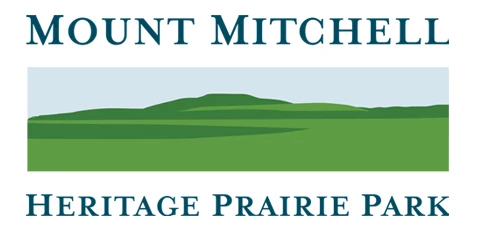
MOUNT MITCHELL PRAIRIE GUARDS
Will Mitchell had a dream.
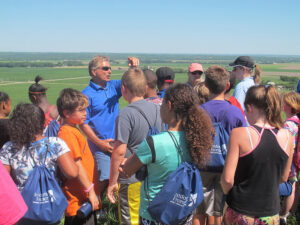 The youngest son of abolitionist Captain William Mitchell and his wife Mary, Will envisioned the majestic hilltop prairie on his father’s farm as a public Park where the stories of those who made Kansas free from slavery would be kept alive.
The youngest son of abolitionist Captain William Mitchell and his wife Mary, Will envisioned the majestic hilltop prairie on his father’s farm as a public Park where the stories of those who made Kansas free from slavery would be kept alive.
When Will died in 1953 he left that 30-acre hilltop prairie to the Kansas Historical Society so they could fulfill his vision. Unfortunately, after 50 years that hadn’t happened and the society began plans to return the land to Will’s heirs.
In 2000, when local residents and those familiar with the stories of the Connecticut-Kansas Colony heard this news they came together and formed what became the Mount Mitchell Prairie Guards. The Guards worked with our elected representatives and Audubon of Kansas to transfer the Park to local control, which was accomplished in 2006.
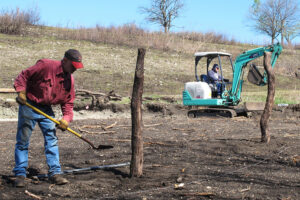 Since that time Will’s vision has become a reality. Thousands of hours of volunteer labor and the purchase of additional acreage has transformed the property into a beloved community asset.
Since that time Will’s vision has become a reality. Thousands of hours of volunteer labor and the purchase of additional acreage has transformed the property into a beloved community asset.
We are a 501 (c) 3 nonprofit and our informal membership includes 250 local families and individuals and supporters from across the country. Our current five-member board is comprised of a Mitchell family member, local rancher, attorney, university administrator and a former film location manager. Plans are underway to increase the size of the board.
When the Park’s transfer was complete we immediately began a program to eradicate and control invasive brush and trees. We have organized and supervised over 2,000 volunteer hours of prairie restoration and management with guidance from grassland scientists and experienced ranchers.
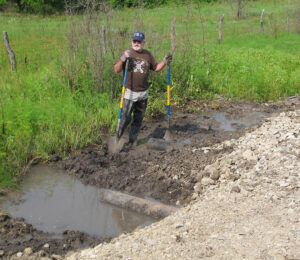 We have also developed the Park’s infrastructure: increased the size of the park to 170 acres, built a gravel access road, parking area, information kiosk and 2 miles of walking trails. We’ve erected interpretive signage, built new fencing, and added picnic tables and memorial benches.
We have also developed the Park’s infrastructure: increased the size of the park to 170 acres, built a gravel access road, parking area, information kiosk and 2 miles of walking trails. We’ve erected interpretive signage, built new fencing, and added picnic tables and memorial benches.
Today, a wide range of visitors including scouting groups, I-70 travelers and tourists, birders, prairie enthusiasts and geocachers enjoy Mount Mitchell’s experience of history and tallgrass prairie.
Hundreds of schoolchildren from school districts throughout the region visit the Park annually to experience the prairie and learn about the region’s important role in our national story, the enduring struggle for freedom. In the fall travelers along nearby I-70 detour onto the Native Stone Scenic Byway to see the Park’s legendary Big Bluestem growing 7 feet tall.
Mount Mitchell Heritage Prairie Park is a partner and Star Attraction of the Freedom’s Frontier National Heritage Area, a site of national significance in the National Park Service Underground Railroad Network to Freedom Program, and a featured attraction along the Native Stone Scenic Byway.
The Park serves regional educators and home-schoolers as a valuable outdoor classroom where students are engaged in hands-on learning activities in a variety of subjects including, history, geography, geology, biology, astronomy and civics. To date, classes from area school districts including USDs 320, 329, 330 and 383 have utilized the important resources we have to offer.
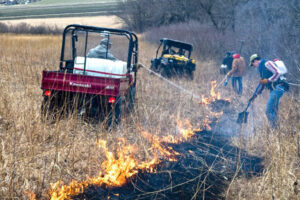 We give young people opportunities to learn about westward expansion and the value of civil discourse when they hear abolitionist preacher Henry Ward Beecher’s words while standing on the very site where his supporters confronted the evils of slavery. And we inspire them to protect our nation’s natural resources as they walk the Park’s trails where our management practices are preserving tallgrass prairie from the advance of invasive species and woody encroachment.
We give young people opportunities to learn about westward expansion and the value of civil discourse when they hear abolitionist preacher Henry Ward Beecher’s words while standing on the very site where his supporters confronted the evils of slavery. And we inspire them to protect our nation’s natural resources as they walk the Park’s trails where our management practices are preserving tallgrass prairie from the advance of invasive species and woody encroachment.
The Prairie Guards are grateful to the following organizations that have partnered with us to create the Park that is enjoyed today.
Freedom’s Frontier National Heritage Area, The Kansas Historical Society, Audubon of Kansas, The Kansas Trails Council, Westar Green Team, Native Stone Scenic Byway, Wabaunsee Township Board, Wabaunsee County Historical Society, Wamego Historical Society, Wabaunsee County Commissioners, Pottawatomie County Economic Development Council, Wabaunsee County Economic Development Committee, Flint Hills Regional Council, Flint Hills Discovery Center, The National Park Service, The Kansas Department of Wildlife, Parks and Tourism, the Kansas Department of Transportation, The Citizens Band and Prairie Band Potawatomi Nations, Symphony in the Flint Hills , Konza Prairie Biological Station, The Nature Conservancy, and Kansas Ranchland Trust.
And a special thanks to the heirs of William Izott Mitchell, and to the Park’s neighbors, the Breymeyer, Zerbe, Brummett, Crisler, and Stauffer families.
